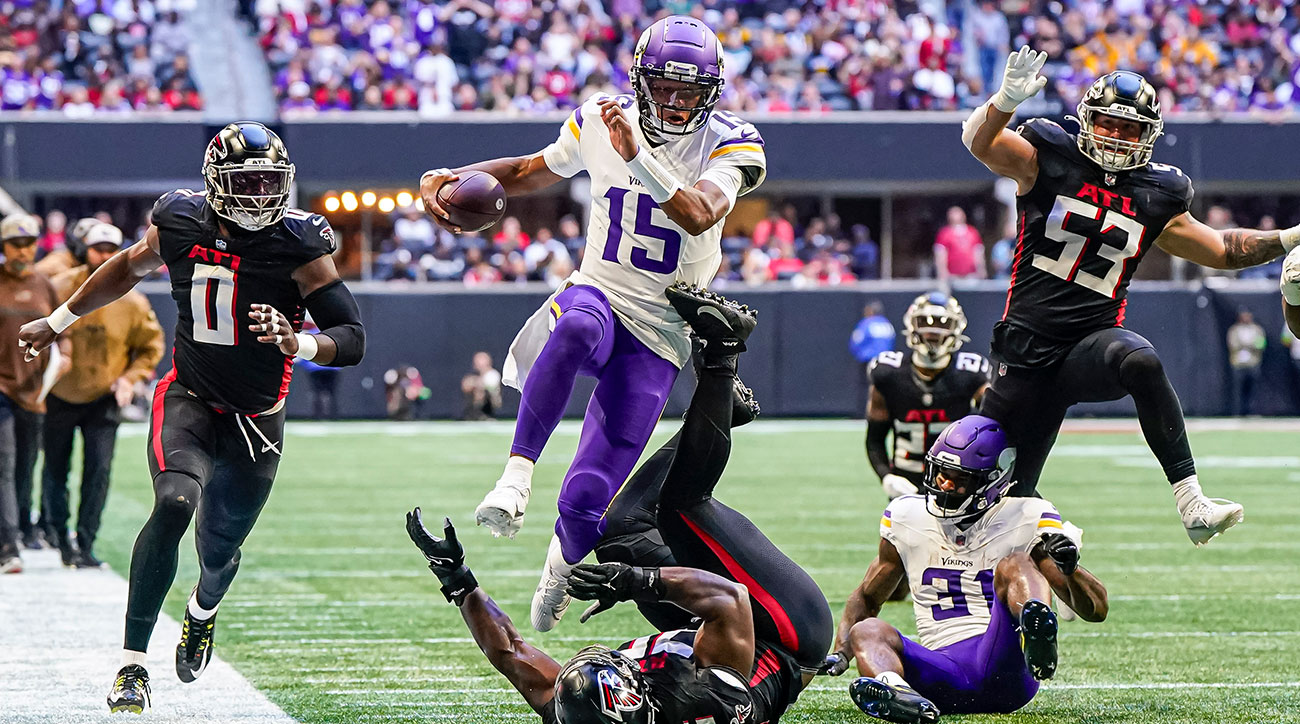NFL Is Better Off With Joshua Dobbs and the Vikings Going for It

The Vikings are ultimate proof that there are two totally disparate, but oddly parallel, conversations that happen in regards to an NFL team each year: 1) What is best for the organization, and 2) what is the best for each person in the locker room at a given moment who could care less about the holistically crafted 10-year business plan presented by some Harvard MBA during their front-office interview.
Minnesota continues to butt up against a theoretical ceiling. The best option for this franchise remains to tether itself to Kirk Cousins in the interim and to make marginal and affordable roster improvements that will not scramble the salary cap, in an effort to eventually find a safe landing space with a high-upside rookie passer on an affordable, nonguaranteed contract. There’s a theoretical idea of what can phase the Vikings out of what was an older team when Mike Zimmer was fired in 2021.
Then there is a much simpler version of the business plan under second-year coach Kevin O’Connell on Sunday: F--- it, we’re going to win a game with Joshua Dobbs, who still hasn’t been able to drop his bags off at the hotel after flying here from Arizona at the trade deadline.

The Vikings’ stunning victory over the Falcons, which pushed the team to 5–4, inside the bubble of the NFC playoff race, is precisely what makes the NFL great. On paper, this was a team that needed to be torn down before last season, and in some more marginal ways, was heading in that direction anyway. In our grandest visions of the trade deadline this year, everyone not named Justin Jefferson and Jordan Addison was to be given away at Dollar General prices (which are, ridiculously, more than a dollar now by the way).
But this is a team that continues to win anyway. Last year, the Vikings did not inspire confidence despite a 13–4 record and a top-10 offense (at least in terms of less sophisticated, baseline statistics). Their historic performance in one-score games (11 wins and zero losses) and dreadful performances in losses that were not close, combined with a loss to the equally difficult-to-figure-out Giants in the playoffs, was far more of a red flag than an invitation to invest assets into this team immediately. This was supposed to be the year when the inversion of that luck manifested itself. After the team started 1–4, going—you guessed it—winless in one-score games, the front office seemed justified in its pronounced lack of aggression in free agency and its penchant for trading back in the draft.
Then came a stunning win over the 49ers, packaged with victories over the punchless Packers and adrift Bears. Cousins tore his Achilles just before the trade deadline, and the havers of both of those conversations, the what-is-best-right-now people and the what-is-best-long-term people, had to look at one another like Dale and Brennan at the beginning of Step Brothers and decide to become best friends (yes, we now have to call Dobbs “Nighthawk”).
How beautiful is it when a team, over the course of a few weeks, transitions from a poster child of good fortune to a poster child of resilience?
There was Jaren Hall slinging a wheel route to Alexander Mattison on his second drive. There was O’Connell choosing not to bury the rookie fifth-round pick in the run game, instead letting him pass on the vast majority of his snaps. There was Dobbs, after getting plugged for a safety on his first drive after replacing the injured Hall, after logging his first game-winning drive in his NFL career a few weeks ago, stomping down the field against one of the best pass defenses in football this year. There was Addison, making a catch of the year candidate as he was buried from behind by a surging defender.
When Dobbs slid his way out of Bud Dupree’s outstretched hands on fourth down, it should have been a message received from those of us who believe we can view a team from 30,000 feet and make decisions about what is best.
How beautiful is it that the Vikings are now making us question everything? What if last year wasn’t luck so much as it was a crash course in understanding this team’s identity? Minnesota could have trusted the common-sense notion that this team was not good enough at the deadline, but instead has given the locker room eight more chances to show us that maybe there could not have been a better plan all along than, F--- it, we’re winning with Dobbs.
